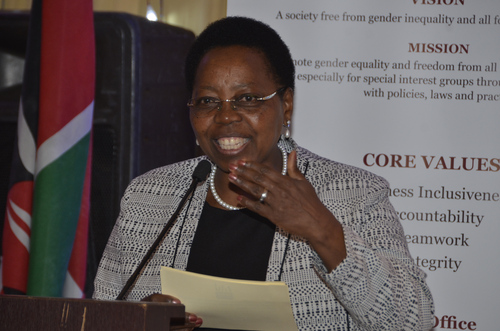STATEMENT ON OBSERVANCE OF THE INTERNATIONAL DAY OF ZERO TOLERANCE FOR FGM
The National Gender and Equality Commission joins the rest of the world in commemorating the International Day of Zero Tolerance for Female Genital Mutilation. This is an awareness day marked every 6th February to educate the public on issues of Female Genital Mutilation (FGM), mobilize political will and resources to eradicate FGM and celebrate achievements and preserve gains made so far in the efforts of ending FGM.
The theme for the year 2021 is ‘No Time for Global Inaction, Unite, Fund, and Act to End Female Genital Mutilation’. The theme seeks to promote the elimination of FGM through coordinated and systematic efforts and through unconditional funding of all efforts seeking to eliminate FGM. The theme provides Kenya with an opportunity to reflect on the progress made and identify effective strategies for ending FGM before 2030. Such efforts include among others greater involvement and engagement of the communities and their opinion leaders, promotion of community declarations against FGM, sex education, more involvement of men and youth in denouncing FGM, and enforcement of anti-FGM laws.
FGM is not only a harmful cultural practice but a human rights violation and reveals the inherent inequality between girls and boys and women and men. It impedes on the rights of women and girls including sexual and reproductive health and exposes them to serious health, psychological, physical, social effects.
According to the Kenya Demographic Health Survey, 2014 the national prevalence of FGM declined from 32 per cent in 2003 to 27 per cent in 2008/2009 and 21 per cent in 2014, pointing to a positive trajectory towards total elimination. A report by the United Nations Population Fund on The State of the World Population, 2020 indicates that as the COVID-19 pandemic persists, 4.1 million girls are at the risk of being subjected to the practice of FGM in the year 2021. Further, the pandemic has directly slowed down key efforts designed by states, private sector and communities towards the elimination of all forms of harmful practices including FGM.
In Kenya, the emergence of the COVID-19 pandemic in March 2020 saw the introduction of containment measures formulated to curb the rapid spread of the coronavirus. These measures included the closure of schools. World Wide schools are often used as safe spaces for girls at risk of FGM. While at home, girls were persuaded and sometimes forced to make the cut. The pandemic related economic disruptions also increased vulnerabilities of girls and exposed them to abuse, sexual violence, early and forced marriages, and degrading treatments.
Kenya has a robust policy and legal framework that outlaws the practice of FGM. The Constitution of Kenya, 2010 explicitly outlaws harmful cultural practices. Specifically, Article 44 (3) bars any person from compelling another person to perform, observe or undergo any cultural practise or rite. Article 53(d) states that children should not be subjected to harmful cultural practices, inhuman and degrading treatment. Article 55(d) requires the State to take measures, including affirmative action programmes, to ensure that the youth are protected from harmful cultural practices and exploitation.
In 2011, the Government enacted the Female Genital Mutilation (FGM) Act, and in 2015, the State adopted the National Policy for Prevention and Response to Gender-Based Violence. Other legal frameworks in place to protect women and girls from FGM and other harmful practices include; the Protection against Domestic Violence Act, 2015, the Sexual Offences Act 2006, the Children’s Act 2001, and the National Policy for the Eradication of Female Genital Mutilation, 2019.
Kenya has established a national Anti-Female Genital Mutilation Board to coordinate and spearhead multi-agency programs on the eradication of FGM. In 2020, the Government signed a commitment during the Nairobi Summit on International Conference on Population and Development (ICPD25), to put an end to FGM by the year 2022. Besides, Kenya is a signatory to several International and Regional instruments which obligates member States to end harmful cultural practices and eliminate violence against women. Target 5.3 of the Sustainable Development Goals (SDGs) calls for the elimination of all harmful practices such as FGM. Goal 51 of the Africa Agenda 2063 calls for the elimination of all social harmful practices including FGM and ending barriers that hinder girls and women from accessing quality health and education.
Despite the foregoing efforts, data shows that FGM is still high in some communities and about one half (22) of the counties in Kenya. There is also emerging trends that indicate changes in the age, time, manner and place where and when the practices take place. Some advocates are pushing for the legalization of FGM. Further, there are many cases of the medicalization of FGM where the cut is conducted and supervised by health personnel. Such efforts contribute to clawing back gains made this far in eradicating FGM in Kenya.
The commemoration of this day, therefore, invites discussions around necessary policy reforms, resources, political goodwill and public education required to build a strong community-driven program to ending FGM. The Commission affirms its position that it is possible to completely eradicate FGM if all actors are committed and united towards this goal. The Commission further remains committed to supporting zero tolerance to FGM through monitoring the implementation of anti-FGM laws, policies, and programs.
Together we can do more. Let us take action, Unite, and Fund to End Female Genital Mutilation’
Thank you.
Dr. Joyce M. Mutinda (PhD)
Chairperson


Comments